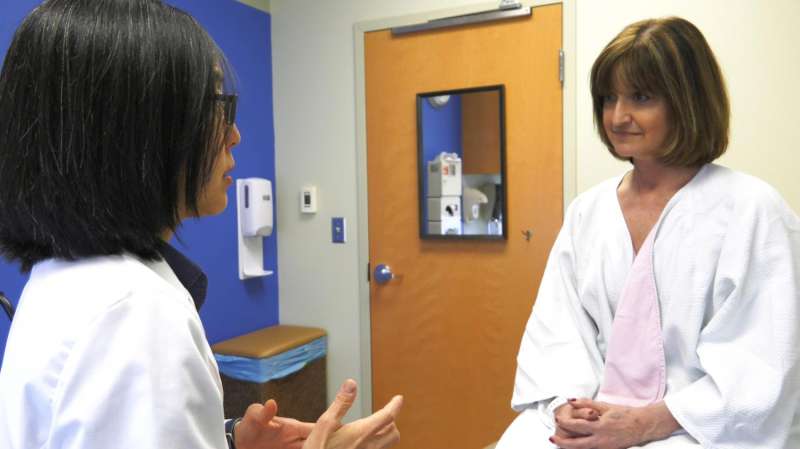Half of breast cancer patients pursue reconstruction without understanding risks

More than half of breast cancer patients (57 percent) undergoing mastectomy lack the necessary medical knowledge to make a high-quality decision about reconstructive surgery that aligns with their personal goals, suggesting a trend toward overtreatment, according to a new study conducted by researchers at The Ohio State University Comprehensive Cancer Center - Arthur G. James Cancer Hospital and Richard J. Solove Research Institute (OSUCCC - James).
"High-quality" decisions were defined as those that demonstrated adequate medical knowledge of treatment choices - including associated risks - and that also matched with the patient's specific goals and preferences for choosing whether or not to pursue reconstructive surgery.
Researchers say shared decision-making tools are needed to help women make decisions based on a full understanding of treatment choices and associated risks alongside their personal goals for surgery.
Researchers report the findings online first in the medical journal JAMA Surgery May 3, 2017.
Study Design and Methods
In this observational, single-institution study, researchers sought to evaluate the quality of 126 adult breast cancer patients' decisions about breast reconstruction after mastectomy. All patients had stage I-III invasive ductal/lobular breast cancer, ductal carcinoma in situ (DCIS) or were having preventive mastectomies. The majority of patients (73 percent) had early-stage disease.
Researchers measured study participants' medical knowledge about mastectomy and mastectomy with reconstruction—for example, effects of surgery on appearance and associated risks. They also measured individual preferences of what mattered most to patients. Key preference factors included breast appearance/shape post treatment, length of recovery time and risk for complications.
"We found that less than half of the women had adequate medical knowledge about breast reconstruction and made a choice that aligned with their personal preferences. This is very concerning to us, because it means that some women did not get the treatment they truly preferred, and quite a few had more treatment than they preferred," says Clara Lee, MD, principal investigator of the study and a breast reconstructive surgeon at The OSUCCC - James. Lee holds a dual associate professor appointment in the colleges of medicine and public health at Ohio State.
"Many women were quite concerned about complication risks, but they didn't actually know how high the risk was. This may explain some of the overtreatment that we saw," she adds.
Researchers found that only 43 percent of the patients in the study demonstrated an understanding of at least half of the important facts about reconstruction and made a choice that was consistent with their preferences. Understanding of surgical complications was particularly low, with only 14 percent of patients demonstrating strong knowledge of associated risks.
"As breast cancer providers, we need to talk about the pros and cons of surgery to help women make treatment choices. Shared decision-making between the surgeon and patient would be particularly useful for this decision. We need to connect patients with decision aids to help them really think through what is most important to them," Lee adds.
Collaborators in this National Cancer Institute-funded study include Allison Deal, MD, and Ruth Huh, BA, of Lineberger Comprehensive Cancer Center at University of North Carolina Chapel Hill; Michael Pignone, MD, MPH, of University of Texas at Austin; and Peter Ubel, MD, of Duke University.
"The interesting thing is that these findings are not unique to breast reconstruction," adds Pignone, study coauthor and chair of the Department of Internal Medicine at the Dell Medical School at The University of Texas at Austin. "In other places where we've looked at decision quality, we see gaps in patients' understanding of key information and poor alignment between the things they care most about and the treatments that they choose. It means that we need to do a much better job of providing decision support to patients, so that the care they get is, ultimately, the care they want."
Patient-Doctor Communication Research Underway
Lee and colleagues in Ohio State's colleges of engineering, communication and public health are working on a study to evaluate treatment decisions in early-stage breast cancer patients to assess how communication with their providers affects their decision-making. This ongoing study examines patients' knowledge, preferences, and expectations about future well-being. Information from this study is expected to help clinicians develop tools to aid patients in making an informed decision about their care.
More information: JAMA Surgery (2017). DOI: 10.1001/jamasurg2017.0977

















